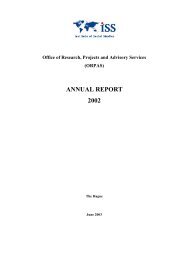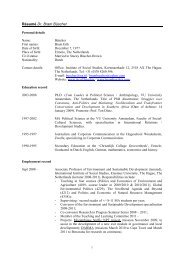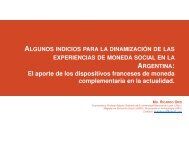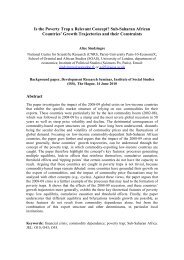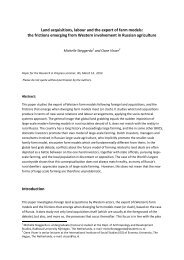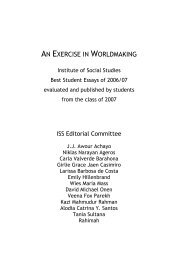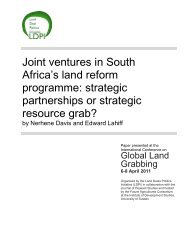AN EXERCISE IN WORLDMAKING 2009 - ISS
AN EXERCISE IN WORLDMAKING 2009 - ISS
AN EXERCISE IN WORLDMAKING 2009 - ISS
Create successful ePaper yourself
Turn your PDF publications into a flip-book with our unique Google optimized e-Paper software.
4 S<strong>AN</strong>JUKTA CHAUDHURI<br />
litical unit of power dynamics and inequality which etched women’s discriminated<br />
status and subordinate role in the public place e.g. labour<br />
market (Okin,1997: 14-16). During the 1970s, Nancy Chodorow and<br />
Dorothy Dinnerstien analyzed ‘family’ from a psychoanalytical viewpoint.<br />
It was then that they developed the understanding of the differences<br />
between boys and girls and related inequalities being entrenched in<br />
the child-rearing arrangements, where the mother (woman) was seen as a<br />
care taker, emotional vis-à-vis a father (man) working, bread winner<br />
hence more rational. This inevitably impacts the psychological development<br />
of children, where girls are able to associate to their same sex caretaker<br />
in a more relational way while boys get more inclined ‘not to be<br />
feminine’ and ally with more masculine traits. Thus, according to their<br />
theory it was only gender equal child rearing that would help in resolving<br />
misogyny and prevent such psychologies (ibid: 17).<br />
It is in this historical, socio-political and cultural context that the<br />
young generation is raised and resultantly the concept of ‘youth’ formulated<br />
breeds ‘maleness’ in its conceptualization.<br />
Taking lead from the above, whilst analyzing the conceptualization of<br />
‘youth’ another facet that draws considerable attention is the process of<br />
‘production of knowledge’. Questions like who is involved in the creation<br />
of knowledge, the embedded power dynamics, construction of<br />
meaning, its relation with ‘reality’ and the relevance of usage of language;<br />
also, whether all of these have had a bearing on the interpretation of<br />
meaning and creation of ‘truth’ in social sciences, becomes pertinent in<br />
the context of this paper. Feminist studies reveal that men were considered<br />
intellectually more capable and rational in the field of academics<br />
compared to women’s lack of ‘reasoning’ and ability to think about basic<br />
levels, bestowing men with privileged access as custodians to the ‘production<br />
of knowledge’. So, it can be said that the ‘male-defined models<br />
of knowledge’ when translated into theory was not perceived as maleoriented<br />
as was well disguised under the accreditation of attaining value<br />
of being ‘universal’ and ‘objective’ truth in the field of social sciences<br />
(Gunew, 1990: 15). Brannen, McRobbie and Garber (in Phoenix, 1997:<br />
2) further state that ‘in the study of young people, gender has only recently<br />
begun to receive sustained attention […] that young women were<br />
generally omitted from studies which claimed to be of youth, but were<br />
really of young men. Thus, knowledge produced about young men was<br />
treated as if it pertained to all young people’.




